Solo swimming. As soldiers from the Soviet construction battered the world.
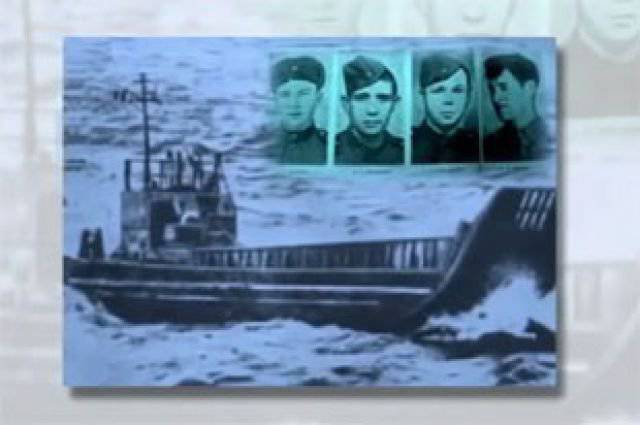
Barge T-36
“They are not born as heroes, they become heroes” - this wisdom is best suited to stories Four Soviet guys shook the world in the spring of 1960 year.
Young guys were not eager for fame and fame, did not dream of exploits, just once life put them before a choice: to become heroes or die.
January 1960 of the year, Iturup Island, one of the very island of the South Kuril Ridge, which Japanese neighbors still dream of.
Because of the rocky shallow water, cargo delivery to the island by ships is extremely difficult, and therefore the function of a transit point, a “floating pier” near the island, was performed by a self-propelled tank landing barge T-36.
Behind the formidable phrase “tank landing barge” was a small ship with a displacement of one hundred tons, whose length along the waterline was 17 meters, the width was three and a half meters, and the draft was slightly more than a meter. The maximum speed of the barge was 9 nodes, and the T-36 could move no more than the 300 meters away from the coast without being at risk.
However, for those functions that the barge performed at Iturup, it was quite suitable. Unless, of course, there was a storm on the sea.
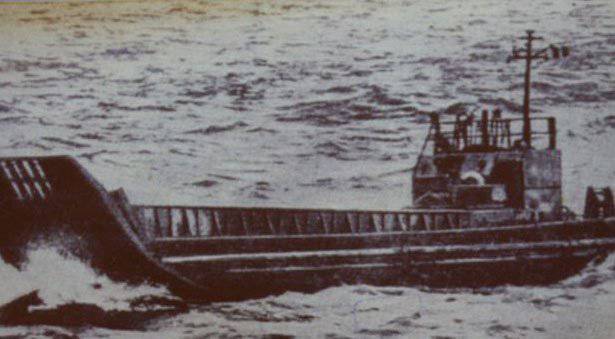
Missing
And 17 January 1960, the element was played out in earnest. At about 9 in the morning wind, reaching 60 meters per second, pulled the barge from the mooring and began to carry it into the open sea.
Those who remained on the shore could only watch the desperate struggle that was waged with the angry sea by people aboard the barge. Soon the T-36 disappeared from sight ...
When the storm subsided, the search began. Some things from the barge were found on the shore, and the military command came to the conclusion that the barge and the people on it were dead.
On board the T-36 at the time of her disappearance there were four soldiers: 21-year-old junior sergeant Askhat Ziganshin21 year old Private Anatoly Kryuchkovsky20 year old Private Philip Poplavsky and one more private, 20-year-old Ivan Fedotov.
The relatives of the soldiers were told that their relatives were missing in the performance of their military duty. But the apartments were still monitored: what if someone from the missing did not die, but simply deserted?
But most of the fellow soldiers believed that the soldiers disappeared into the ocean depths ...
Gone With the Wind
The four on board the T-36 fought the elements for ten hours until the storm finally subsided. All the meager fuel reserves went into the struggle for survival, the 15-meter waves strongly battered the barge. Now it just took it farther and farther into the open ocean.
Sergeant Ziganshin and his comrades were not sailors - they served in the engineering and construction troops, which in the slang are called "construction battalion".
They were sent to the barge to unload a freighter that was about to come up. But the hurricane decided otherwise ...
The situation in which the soldiers found themselves looked almost hopeless. The barge no longer has any fuel, there is no connection with the shore, there is no flow in the hold, not to mention that the T-36 is not suitable for such “journeys” at all.
From the food on the barge were a loaf of bread, two cans of stew, a can of fat and a few spoons of cereal. There were two more buckets of potatoes, which were scattered during the storm in the engine room, which made it soaked with fuel oil. Overturned and drinking water tank, which is partially mixed with sea water. There was also a stove-stove, matches, and a few packs of Belomor.
Prisoners of the "flow of death"
The fate of them allegedly mocked: when the storm subsided, Askhat Ziganshin found the Krasnaya Zvezda newspaper in the wheelhouse, which said that just in the area where they were taken, training missile launches should take place, in connection with which the entire area was declared unsafe for navigation.
The soldiers concluded: nobody will search for them in this direction until the end of the missile launches. So you need to hold out until they finish.
Fresh water was taken from the engine cooling system — rusty but usable. Also collected rainwater. As a meal, a stew was cooked - a little stew, a couple of potatoes smelling of fuel, just a little cereal.
On such a diet, it was necessary not only to survive on their own, but also to fight for the survivability of the barge: to clear ice from the sides to prevent its overturn, to pump out the water that was collected in the hold.
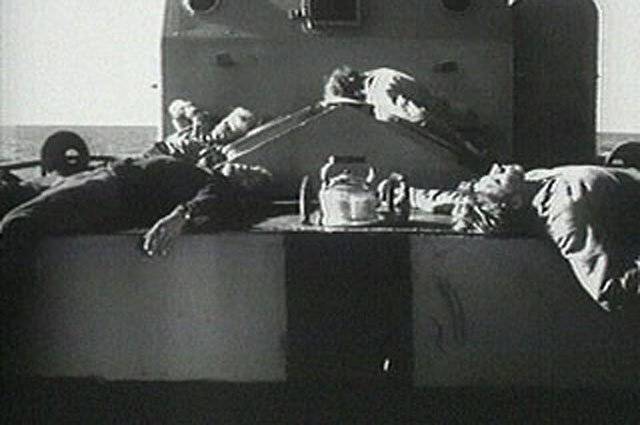
We slept on one wide bed, which we built ourselves - clinging to each other, we were keeping warm.
The soldiers did not know that the current that carried them farther and farther from home was called the “course of death”. They generally tried not to think about the worst, because from such thoughts it was easy to fall into despair.
A sip of water and a piece of boot
Day by day, week by week ... Food and water are less and less. Once, Sergeant Ziganshin recalled the story of a school teacher about sailors who had suffered disaster and suffered from hunger. Those sailors cooked and ate leather things. The sergeant's belt was leather.
First they cooked, crumbled into noodles, a belt, then a strap from a broken and inactive radio, then they began to eat boots, tore off and ate the harmonica that appeared on board ...
With water, the situation was very bad. In addition to soup, she got everyone a sip. Once every two days.
The last potato was cooked and eaten on February 23, on the Day of the Soviet Army. By that time, auditory hallucinations were added to the throes of hunger and thirst. Ivan Fedotov began to be tormented by bouts of fear. Comrades supported him, as they could, reassured.
For all the drift time in the four, not a single quarrel, not a single conflict occurred. Even when there was practically no strength left, not one tried to take away food or water from a friend in order to survive on his own. They just agreed: the last one who will survive, before dying, will leave a record on the barge about how the T-36 crew died ...
"Thank you, ourselves!"
2 March they first saw the vessel passing in the distance, but it seems that they themselves did not believe that it was not a mirage before them. March 6 new ship appeared on the horizon, but the desperate signals for help, which served the soldiers, did not notice it.
7 March 1960 year aviation a group from the American aircraft carrier Kearsarge discovered a T-36 barge about a thousand miles northwest of Midway Island. The semi-flooded barge, which should not be more than 300 meters from the shore, traveled more than a thousand miles across the Pacific Ocean, covering half the distance from the Kuril Islands to Hawaii.
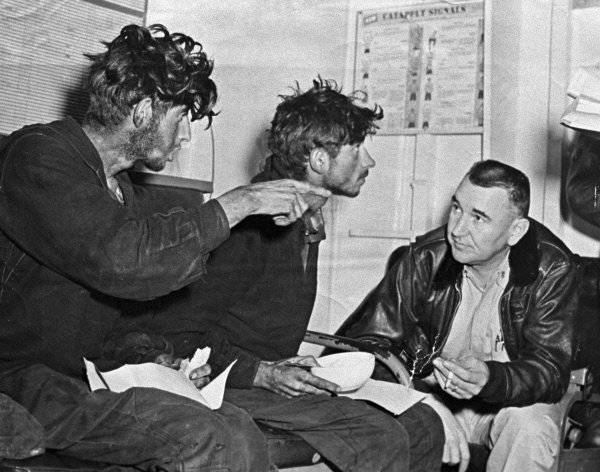
The Americans in the first minutes did not understand: what, actually, is a miracle in front of them and what kind of people are floating on it?
But the sailors from the aircraft carrier survived even more shock when a sergeant Ziganshin, who was brought in from a barge by helicopter, said: we are fine, we need fuel and food, and we will sail to home.
In fact, of course, the soldiers could not sail anywhere. As the doctors later said, the quartet was left to live quite a bit: death from exhaustion could have come in the coming hours. And on the T-36 by the time there was one boot and three matches.
American doctors marveled not only by the stamina of the Soviet soldiers, but also by surprising self-discipline: when the crew of the aircraft carrier began to offer them food, they ate a little bit and stopped. If they had eaten more, they would have died at once, as many had died after a long famine.
Heroes or traitors?
On board the aircraft carrier, when it became clear that they were rescued, the forces finally left the soldiers - Ziganshin asked for a razor, but fainted near the washstand. Shaving him and his comrades had the sailors "Kirsarj".
When the soldiers fell asleep, a completely different kind of fear began to torment them - there was a cold war in the yard, and they were not helped by anyone, but by a “likely adversary”. In addition, a Soviet barge fell into the hands of the Americans.
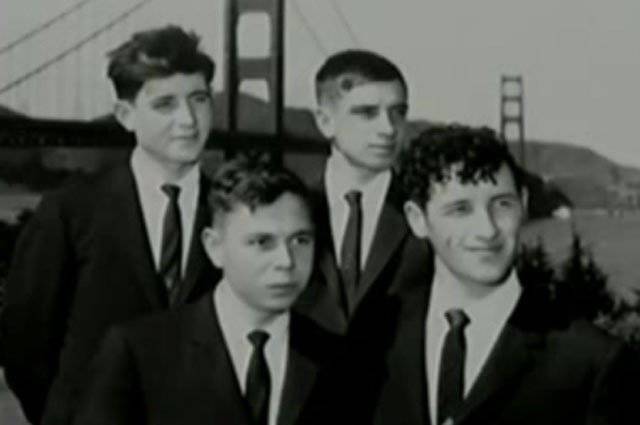
The captain of Kirsarj, by the way, could not understand why the soldiers so eagerly demanded that he load this rusty trough aboard an aircraft carrier? To calm them down, he told them: the barge would tow another ship to the port.
In fact, the Americans sank the T-36 - not because of the desire to harm the USSR, but because the half-submerged barge posed a threat to shipping.
To the credit of the American military, towards the Soviet soldiers, they behaved very worthily. Nobody tortured them with questions and interrogations; moreover, they put guards on the cabins where they lived, so that the curious wouldn't bother them.
But the soldiers were worried about what they would say in Moscow. And Moscow, having received news from the USA, was silent for a while. And this is understandable: in the Soviet Union, they were waiting for the saved political asylum in America to be asked not to be trapped with their statements.
When it became clear that the military was not going to “choose freedom”, the four Ziganshin’s feat was talked on television, on radio and in newspapers, and the Soviet leader Nikita Khrushchev sent them a welcoming telegram.
"How does the boots taste?"
The first press conference of the heroes took place on the aircraft carrier, where about fifty journalists took by helicopters. I had to finish it ahead of time: Askhat Ziganshin had a nose bleed.
Later, the guys gave a lot of press conferences, and almost everywhere they asked the same question:
- How does the boots taste?
“The skin is very bitter, with an unpleasant smell. But did it really taste like that? There was only one wish: to deceive the stomach. But just do not eat the skin: too hard. Therefore, we cut a small piece and set it on fire. When the kersey burned, it turned into something similar to charcoal and became soft. This "delicacy" we smeared with grease so that it was easier to swallow. Several of these “sandwiches” made up our daily ration, ”Anatoly Kryuchkovsky later recalled.
Already at home the same question was asked by schoolchildren. “Try it yourself,” Philip Poplavsky joked once. I wonder how many boots the experimenter boys welded after this in 1960's?
By the time the aircraft carrier arrived in San Francisco, the heroes of the unique voyage, which, according to the official version, lasted 49 days, had already gotten stronger. America greeted them enthusiastically - the mayor of San Francisco handed them the "golden key" from the city.
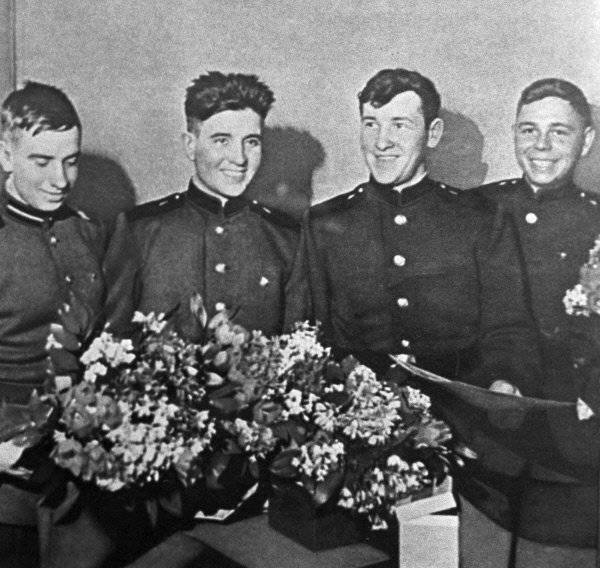
"Iturup Four"
The hospitable hosts dressed the soldiers in suits in the latest fashion, and the Americans literally fell in love with the Russian heroes. In the photos taken at that time, they really look great - neither give nor take the "Liverpool Four".
Experts admired: young Soviet guys in a critical situation did not lose their human appearance, did not become brutalized, did not enter into conflicts, did not sink to cannibalism, as happened to many of those who were in similar circumstances.
And ordinary residents of the United States, looking at the photo, wondered: is it the enemy? Dearest guys, a little shy, that only adds to their charm. In general, for the image of the USSR, four soldiers during their stay in the United States did more than all the diplomats.
By the way, with regard to comparisons with the "Liverpool Four" - Ziganshin and his comrades did not sing, but they left a mark in the history of Russian music with a composition called "Ziganshin-Boogie."
Domestic dudes, now sung in cinema, created a song to the tune of "Rock Around the Clock", dedicated to the T-36 drift:
Like the pacific
Sinking barge with dudes.
Dudes do not lose heart,
Rock on the deck throw.
Ziganshin-rock, Ziganshin-boogie,
Ziganshin - a guy from Kaluga,
Ziganshin-boogie, Ziganshin-rock,
Ziganshin devoured his boot.
Poplavsky-rock, Poplavsky-boogie,
Poplavsky ate a friend's letter,
While Poplavsky teeth grinned,
Ziganshin ate his sandals.
The days are swimming, the weeks are swimming,
The ship wears on the waves
Boots already ate in the soup
And with an accordion in half ...
Of course, to compose such masterpieces is much easier than to survive in such conditions. But modern filmmakers are more stylish.
Glory comes, glory goes ...
Upon returning to the USSR, the heroes waited for a reception at the highest level - a rally was organized in their honor, the soldiers were personally received by Nikita Khrushchev and Defense Minister Rodion Malinovsky.
All four were awarded orders of the Red Star, they made a film about their voyage, wrote several books ...
The popularity of the foursome T-36 barge began to descend only at the end of 1960's.
Soon after returning home, the soldiers were demobilized: Rodion Malinovsky noticed that the guys had served their full time.
Philip Poplavsky, Anatoly Kryuchkovsky and Askhat Ziganshin, on the recommendation of the command, entered the Leningrad Naval Technical College, which they graduated from in 1964 year.
Ivan Fedotov, a boy from the banks of the Amur, returned home and worked all his life as a riverman. He was gone in 2000 year.
Philip Poplavsky, who settled near Leningrad, after graduating from college, worked on large sea vessels, went to foreign navigation. He passed away in the 2001 year.
Anatoly Kryuchkovsky lives in Kiev, worked for many years as deputy chief mechanic at the Kiev plant "Leninskaya Kuznitsa".
After graduating from school, Askhat Ziganshin entered the rescue squad in the town of Lomonosov near Leningrad as a mechanic, married, raised two beautiful daughters. After retirement, he settled in St. Petersburg.
They didn’t rush to glory and didn’t worry when the glory, having touched them for several years, disappeared, as if it didn’t exist.
But they will remain heroes forever.
PS According to the official version, as already mentioned, the T-36 drift lasted 49 days. However, reconciliation of dates gives a different result - 51 day. There are several explanations for this incident. According to the most popular, about the "49 days" first said the Soviet leader Nikita Khrushchev. The data officially announced by him no one dared to dispute.
Information